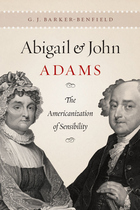
During the many years that they were separated by the perils of the American Revolution, John and Abigail Adams exchanged hundreds of letters. Writing to each other of public events and private feelings, loyalty and love, revolution and parenting, they wove a tapestry of correspondence that has become a cherished part of American history and literature.
With Abigail and John Adams, historian G. J. Barker-Benfield mines those familiar letters to a new purpose: teasing out the ways in which they reflected—and helped transform—a language of sensibility, inherited from Britain but, amid the revolutionary fervor, becoming Americanized. Sensibility—a heightened moral consciousness of feeling, rooted in the theories of such thinkers as Descartes, Locke, and Adam Smith and including a “moral sense” akin to the physical senses—threads throughout these letters. As Barker-Benfield makes clear, sensibility was the fertile, humanizing ground on which the Adamses not only founded their marriage, but also the “abhorrence of injustice and inhumanity” they and their contemporaries hoped to plant at the heart of the new nation. Bringing together their correspondence with a wealth of fascinating detail about life and thought, courtship and sex, gender and parenting, and class and politics in the revolutionary generation and beyond, Abigail and John Adams draws a lively, convincing portrait of a marriage endangered by separation, yet surviving by the same ideas and idealism that drove the revolution itself.
A feast of ideas that never neglects the real lives of the man and woman at its center, Abigail and John Adams takes readers into the heart of an unforgettable union in order to illuminate the first days of our nation—and explore our earliest understandings of what it might mean to be an American.
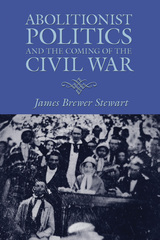

Today the images of Robert Burns and Abraham Lincoln are recognized worldwide, yet few are aware of the connection between the two. In Abraham Lincoln and Robert Burns: Connected Lives and Legends, author Ferenc Morton Szasz reveals how famed Scots poet Robert Burns—and Scotland in general—influenced the life and thought of one of the most beloved and important U.S. presidents and how the legends of the two men became intertwined after their deaths. This is the first extensive work to link the influence, philosophy, and artistry of these two larger-than-life figures.
Lacking a major national poet of their own in the early nineteenth century, Americans in the fledgling frontier country ardently adopted the poignant verses and songs of Scotland’s Robert Burns. Lincoln, too, was fascinated by Scotland’s favorite son and enthusiastically quoted the Scottish bard from his teenage years to the end of his life. Szasz explores the ways in which Burns’s portrayal of the foibles of human nature, his scorn for religious hypocrisy, his plea for nonjudgmental tolerance, and his commitment to social equality helped shape Lincoln’s own philosophy of life. The volume also traces how Burns’s lyrics helped Lincoln develop his own powerful sense of oratorical rhythm, from his casual anecdotal stories to his major state addresses.
Abraham Lincoln and Robert Burns connects the poor-farm-boy upbringings, the quasi-deistic religious views, the shared senses of destiny, the extraordinary gifts for words, and the quests for social equality of two respected and beloved world figures. This book is enhanced by twelve illustrations and two appendixes, which include Burns poems Lincoln particularly admired and Lincoln writings especially admired in Scotland.
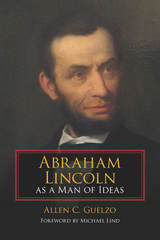
Despite the most meager of formal educations, Lincoln had a tremendous intellectual curiosity that drove him into the circle of Enlightenment philosophy and democratic political ideology. And from these, Lincoln developed a set of political convictions that guided him throughout his life and his presidency. This compilation of ten essays from Lincoln scholar Allen C. Guelzo uncovers the hidden sources of Lincoln’s ideas and examines the beliefs that directed his career and brought an end to slavery and the Civil War.
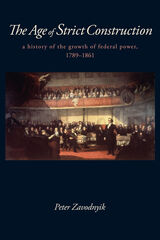
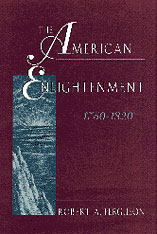

In exploring the origins and character of the American liberal tradition, Myra Jehlen begins with the proposition that the decisive factor that shaped the European settlers’ idea of “America” or the “American” was material rather than conceptual—it was the physical fact of the land. European settlers came to a continent on which they had no history, bringing the ideology of liberal individualism, which they projected onto the land itself. They believed the continent proclaimed that individuals were born in nature and freely made their own society. An insurgent ideology in Europe, this idea worked in America paradoxically to empower the individual and to restrict social change.
Jehlen sketches the evolution of the concept of incarnation through comparisons of American and European eighteenth-century naturalist writings, particularly Emerson’s Nature. She then explores the way incarnation functions ideologically—to both enable and curtail action—in the writing of fiction. Her examination of Hawthorne and Melville shows how the myth of the New World both licensed and limited American writers who set out to create their own worlds in fiction. She examines conflicts between the exigencies of narrative form and the imperatives of ideology in the writings of Franklin, Jefferson, Emerson, and others. Jehlen concludes with a speculation on the implication of this original construction of “America” for the United States today, when such imperial concepts have been called into question.

"To confront American culture is to feel oneself encircled by a thin but strong presence. I call it Emersonian, an imprecise term but one that directs us to a dominant spirit in the national experience." Thus Irving Howe, America's distinguished social critic and a longtime reader of the Sage of Concord, begins this illuminating discussion of Emerson and his disciples and doubters. What is the Emersonian spirit? What inspired it, what propelled it? And what does it mean to us today?
History gave Emerson his opportunity and then took it away. Coming to manhood during the 1830s and 1840s, the time of "the newness" when Americans beheld the world with unbounded expectations, Emerson became the spokesman for the self-reliant new man he believed had arisen, ready to thrust aside mossy traditions and launch a new revolution of freewheeling thought. But the rapid pace of the American experience overtook the Emersonian vision; in the 1850s, the rising problems of slavery, a boom-and-bust economy, the vulgarity of mass culture overwhelmed the idealist. His satellite spirits wavered and shrouded the Emersonian optimism: Hawthorne, with his stories of moral breakdown; Thoreau, rooted in nature yet inclined to the cranky and fanatical; Melville, his fathomless blackness waiting beneath archetypal fables of innocence and evil also Walt Whitman, Orestes Brownson, Twain--all were influenced by, yet reacted against, the Emersonian "newness."
Howe identifies three kinds of response: the literature of work (Melville and Mark Twain),the literature of Edenic fraternity (James Fenimore Cooper, Whitman, Twain again), and the literature of loss (all the post-Civil War writers). He lays before us the intellectual and personal tragedy of the first great American man of letters, yet also shows that Emerson's belief in the untapped power of free men pervades not only the lives and works of his contemporaries but is also a permanent part of the American psyche.
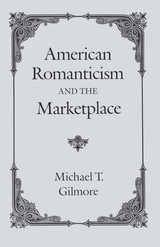
"[Gilmore] demonstrates the profound, sustained, engagement with society embodied in the works of Emerson, Hawthorne, Thoreau and Melville. In effect, he relocates the American Renaissance where it properly belongs, at the centre of a broad social, economic, and ideological movement from the Jacksonian era to the Civil War. Basically, Gilmore's argument concerns the writers' participation in what Thoreau called 'the curse of trade.' He details their mixed resistance to and complicity in the burgeoning literary marketplace and, by extension, the entire ' economic revolution' which between 1830 and 1860 'transformed the United States into a market society'. . . .
"The result is a model of literary-historical revisionism. Gilmore's opening chapters on Emerson and Thoreau show that 'transcendental' thought and language can come fully alive when understood within the material processes and ideological constraints of their time. . . . The remaining five chapters, on Hawthorne and Melville, contain some of the most penetrating recent commentaries on the aesthetic strategies of American Romantic fiction, presented within and through some of the most astute, thoughtful considerations I know of commodification and the 'democratic public' in mid-nineteenth-century America. . . . Practically and methodologically, American Romanticism and the Marketplace has a significant place in the movement towards a new American literary history. It places Gilmore at the forefront of a new generation of critics who are not just reinterpreting familiar texts or discovering new texts to interpret, but reshaping our ways of thinking about literature and culture."—Sacvan Bercovitch, Times Literary Supplement
"Gilmore writes with energy, clarity, and wit. The reader is enriched by this book." William H. Shurr, American Literature
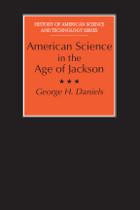
In this first effort to define an American scientific community, originally published in 1968, George Daniels has chosen for special study the 56 scientists most published in the 16 scientific journals identified as “national” during the period 1815 to 1845. In this reprint edition, with a new preface and introduction, Daniels shows how American scientists emerged from a disorganized group of amateurs into a professional body sharing a common orientation and common goals.
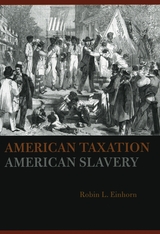
For all the recent attention to the slaveholding of the founding fathers, we still know remarkably little about the influence of slavery on American politics. American Taxation, American Slavery tackles this problem in a new way. Rather than parsing the ideological pronouncements of charismatic slaveholders, it examines the concrete policy decisions that slaveholders and non-slaveholders made in the critical realm of taxation. The result is surprising—that the enduring power of antigovernment rhetoric in the United States stems from the nation’s history of slavery rather than its history of liberty.
We are all familiar with the states’ rights arguments of proslavery politicians who wanted to keep the federal government weak and decentralized. But here Robin Einhorn shows the deep, broad, and continuous influence of slavery on this idea in American politics. From the earliest colonial times right up to the Civil War, slaveholding elites feared strong democratic government as a threat to the institution of slavery. American Taxation, American Slavery shows how their heated battles over taxation, the power to tax, and the distribution of tax burdens were rooted not in debates over personal liberty but rather in the rights of slaveholders to hold human beings as property. Along the way, Einhorn exposes the antidemocratic origins of the popular Jeffersonian rhetoric about weak government by showing that governments were actually more democratic—and stronger—where most people were free.
A strikingly original look at the role of slavery in the making of the United States, American Taxation, American Slavery will prove essential to anyone interested in the history of American government and politics.
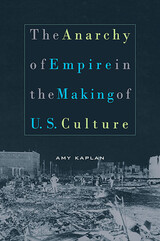
The United States has always imagined that its identity as a nation is insulated from violent interventions abroad, as if a line between domestic and foreign affairs could be neatly drawn. Yet this book argues that such a distinction, so obviously impracticable in our own global era, has been illusory at least since the war with Mexico in the mid-nineteenth century and the later wars against Spain, Cuba, and the Philippines. In this book, Amy Kaplan shows how U.S. imperialism--from "Manifest Destiny" to the "American Century"--has profoundly shaped key elements of American culture at home, and how the struggle for power over foreign peoples and places has disrupted the quest for domestic order.
The neatly ordered kitchen in Catherine Beecher's household manual may seem remote from the battlefields of Mexico in 1846, just as Mark Twain's Mississippi may seem distant from Honolulu in 1866, or W. E. B. Du Bois's reports of the East St. Louis Race Riot from the colonization of Africa in 1917. But, as this book reveals, such apparently disparate locations are cast into jarring proximity by imperial expansion. In literature, journalism, film, political speeches, and legal documents, Kaplan traces the undeniable connections between American efforts to quell anarchy abroad and the eruption of such anarchy at the heart of the empire.
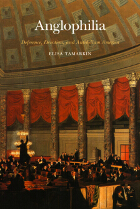
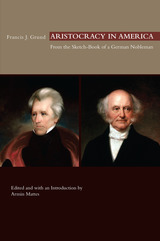
Francis J. Grund, a German emigrant, was one of the most influential journalists in America in the three decades preceding the Civil War. He also wrote several books, including this fictional, satiric travel memoir in response to Alexis de Tocqueville’s famous Democracy in America. Armin Mattes provides a thorough account of Grund’s dynamic engagement in American political life, and brings to light many of Grund’s reflections on American social and political life previously published only in German. Mattes shows how Grund’s work can expand our understanding of the emerging democratic political culture and society in the antebellum United States.
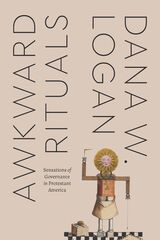
In the years between the American Revolution and the Civil War, there was an awkward persistence of sovereign rituals, vestiges of a monarchical past that were not easy to shed. In Awkward Rituals, Dana Logan focuses our attention on these performances, revealing the ways in which governance in the early republic was characterized by white Protestants reenacting the hierarchical authority of a seemingly rejected king. With her unique focus on embodied action, rather than the more common focus on discourse or law, Logan makes an original contribution to debates about the relative completeness of America’s Revolution.
Awkward Rituals theorizes an under-examined form of action: rituals that do not feel natural even if they sometimes feel good. This account challenges common notions of ritual as a force that binds society and synthesizes the self. Ranging from Freemason initiations to evangelical societies to missionaries posing as sailors, Logan shows how white Protestants promoted a class-based society while simultaneously trumpeting egalitarianism. She thus redescribes ritual as a box to check, a chore to complete, an embarrassing display of theatrical verve. In Awkward Rituals, Logan emphasizes how ritual distinctively captures what does not change through revolution.
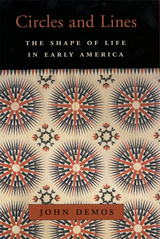
In this intimate, engaging book, John Demos offers an illuminating portrait of how colonial Americans, from the first settlers to the postrevolutionary generation, viewed their life experiences. He also offers an invaluable inside look into the craft of a master social historian as he unearths--in sometimes unexpected places--fragments of evidence that help us probe the interior lives of people from the faraway past.
The earliest settlers lived in a traditional world of natural cycles that shaped their behavior: day and night; seasonal rhythms; the lunar cycle; the life cycle itself. Indeed, so basic were these elements that "almost no one felt a need to comment on them." Yet he finds cyclical patterns--in the seasonal foods they ate, in the spike in marriages following the autumn harvest. Witchcraft cases reveal the different emotional reactions to day versus night, as accidental mishaps in the light become fearful nighttime mysteries. During the transitional world of the American Revolution, people began to see their society in newer terms but seemed unable or unwilling to come to terms with that novelty. Americans became new, Demos points out, before they fully understood what it meant. Their cyclical frame of reference was coming unmoored, giving way to a linear world view in early nineteenth-century America that is neatly captured by Kentucky doctor Daniel Drake's description of the chronography of his life.
In his meditation on these three worlds, Demos brilliantly demonstrates how large historical forces are reflected in individual lives. With the imaginative insights and personable touch that we have come to expect from this fine chronicler of the human condition, Circles and Lines is vintage John Demos.
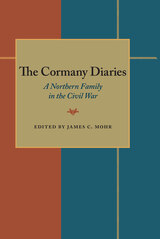
Rachel Cormany (nee Bowman) met Samuel Cormany at Otterbein University in Ohio. After her husband enlisted in a cavalry unit, she writes poignantly of her anxieties, poverty, and loneliness. Samuel, on the other hand, is ambitious in his military career, and tells enthusiastically about his engagements that include camp life, cavalry raids, army politics, and his battles with alcohol. Editor James C. Mohr has arranged the diaries so that the voices of husband and wife alternate, and his notes enlighten many of the issues relating to the diarists and their daily lives.
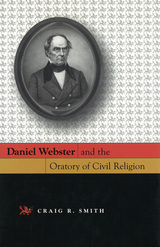

These volumes begin the publication of the greatest diary, both in mass and substance, in American History. Recording a span of sixty-eight years, it has been known heretofore only in partial form. When, over a hundred years ago, Charles Francis Adams edited his grandfather’s diary, he chose to omit “the details of common life,” reduce “the moral and religious speculations,” and retain criticisms of others only if they applied to public figures “acting in the same sphere with the writer.”
Now the diary is being published complete for the first time. Starting with the entries of a twelve-year-old, the present volumes cover John Quincy Adams’ formative year—his schooling and travel broad, study at Harvard, and the first months of training for the law. Adams’ six years overseas with his father took him to a half dozen countries, with lengthy stays in Paris, the Netherlands, and St. Petersburg. On his return he stayed for a time in New York, making the acquaintance of influential congressmen. To finish preparing for college, he lived with an aunt and uncle in Haverhill, caught up in a round of social activities. Entering Harvard with junior standing in the spring of 1786, he graduated in fifteen months.
As Adams matured, diary entries became less a dutiful response to a father’s request and more a record of the young man’s perceptive observations and reflections—and thus a rich source for social history. There are accounts of play-going in Paris, evenings with Lafayette and Jefferson, the diversions of rural New England, apprenticeship in a Newburyport law office. And through the eyes of a serious but not unbending student we are given a picture of Harvard in the 1780s.
Candid opinions of preachers, writers, men of affairs, and family members accompany the closest self-scrutiny. Here is a remarkable record of the passage from adolescence to manhood of a precocious and sensitive boy torn by self-doubt and driving himself to fulfill his promise and his parents’ expectations.

This is the first full-length biography of Elizabeth Palmer Peabody, one of the three notable Peabody sisters of Salem, Massachusetts, and sister-in-law of Nathaniel Hawthorne and Horace Mann. In elegant prose it traces the intricate private life and extraordinary career of one of nineteenth-century America's most important Transcendental writers and educational reformers. Yet Peabody has also been one of the most scandalously neglected and caricatured female intellectuals in American history.
Bruce Ronda has recaptured Peabody from anecdotal history and even blue-stocking portrayals in film--most recently by Jessica Tandy in Henry James's The Bostonians. Peabody was a reformer devoted to education in the broadest, and yet most practical, senses. She saw the classroom as mediating between the needs of the individual and the claims of society. She taught in her own private schools and was an assistant in Bronson Alcott's Temple School. In her contacts with Ralph Waldo Emerson's Transcendental circle in the 1830s, and as publisher of the famous Dial and other imprints, she took a mediating position once more, claiming the need for historical knowledge to balance the movement's stress on individual intuition. She championed antislavery, European liberal revolutions, Spiritualism, and, in her last years, the Paiute Indians. She was, as Theodore Parker described her, the Boswell of her age.
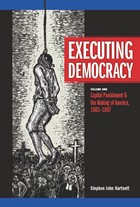
Executing Democracy: Capital Punishment & the Making of America, 1683-1807 is the first volume of a rhetorical history of public debates about crime, violence, and capital punishment in America. This examination begins in 1683, when William Penn first struggled to govern the rowdy indentured servants of Philadelphia, and continues up until 1807, when the Federalists sought to impose law-and-order upon the New Republic.
This volume offers a lively historical overview of how crime, violence, and capital punishment influenced the settling of the New World, the American Revolution, and the frantic post-war political scrambling to establish norms that would govern the new republic.
By presenting a macro-historical overview, and by filling the arguments with voices from different political camps and communicative genres, Hartnett provides readers with fresh perspectives for understanding the centrality of public debates about capital punishment to the history of American democracy.
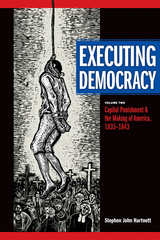
This eye-opening and well-researched companion to the first volume of Executing Democracy enters the death-penalty discussion during the debates of 1835 and 1843, when pro-death penalty Calvinist minister George Barrell Cheever faced off against abolitionist magazine editor John O’Sullivan. In contrast to the macro-historical overview presented in volume 1, volume 2 provides micro-historical case studies, using these debates as springboards into the discussion of the death penalty in America at large. Incorporating a wide range of sources, including political poems, newspaper editorials, and warring manifestos, this second volume highlights a variety of perspectives, thus demonstrating the centrality of public debates about crime, violence, and punishment to the history of American democracy. Hartnett’s insightful assessment bears witness to a complex national discussion about the political, metaphysical, and cultural significance of the death penalty.
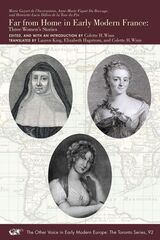
This book showcases three Frenchwomen who ventured far from home at a time when such traveling was rare. In 1639, Marie de l’Incarnation embarked for New France where she founded the first Ursuline monastery in present-day Canada. In 1750, Madame du Boccage set out at the age of forty on her first “grand tour.” She visited England, the Netherlands, and Italy where she experienced firsthand the intellectual liberty offered there to educated women. As the Reign of Terror gripped France, the Marquise de la Tour du Pin fled to America with her husband and their two young children, where they ran a farm from 1794 to 1796. The writings these women left behind detailing their respective journeys abroad represent significant contributions to early modern travel literature. This book makes available to anglophone readers three texts that are rich in both historical and literary terms.
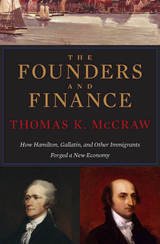
In 1776 the United States government started out on a shoestring and quickly went bankrupt fighting its War of Independence against Britain. At the war’s end, the national government owed tremendous sums to foreign creditors and its own citizens. But lacking the power to tax, it had no means to repay them. The Founders and Finance is the first book to tell the story of how foreign-born financial specialists—immigrants—solved the fiscal crisis and set the United States on a path to long-term economic success.
Pulitzer Prize–winning author Thomas K. McCraw analyzes the skills and worldliness of Alexander Hamilton (from the Danish Virgin Islands), Albert Gallatin (from the Republic of Geneva), and other immigrant founders who guided the nation to prosperity. Their expertise with liquid capital far exceeded that of native-born plantation owners Washington, Jefferson, and Madison, who well understood the management of land and slaves but had only a vague knowledge of financial instruments—currencies, stocks, and bonds. The very rootlessness of America’s immigrant leaders gave them a better understanding of money, credit, and banks, and the way each could be made to serve the public good.
The remarkable financial innovations designed by Hamilton, Gallatin, and other immigrants enabled the United States to control its debts, to pay for the Louisiana Purchase of 1803, and—barely—to fight the War of 1812, which preserved the nation’s hard-won independence from Britain.
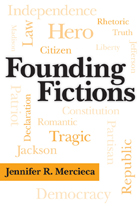
Founding Fictions develops the concept of a “political fiction,” or a narrative that people tell about their own political theories, and analyzes how republican and democratic fictions positioned American citizens as either romantic heroes, tragic victims, or ironic partisans. By re-telling the stories that Americans have told themselves about citizenship, Mercieca highlights an important contradiction in American political theory and practice: that national stability and active citizen participation are perceived as fundamentally at odds.
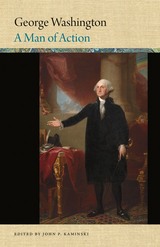
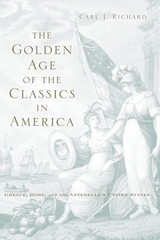
In a masterful study, Carl J. Richard explores how the Greek and Roman classics became enshrined in American antebellum culture. For the first time, knowledge of the classics extended beyond aristocratic males to the middle class, women, African Americans, and frontier settlers.
The classics shaped how Americans interpreted developments around them. The example of Athens allowed politicians of the democratic age to espouse classical knowledge without seeming elitist. The Industrial Revolution produced a backlash against utilitarianism that centered on the classics. Plato and other ancients had a profound influence on the American romantics who created the first national literature, and pious Christians in an age of religious fervor managed to reconcile their faith with the literature of a pagan culture. The classics supplied both sides of the slavery debate with their chief rhetorical tools: the Aristotelian defense of slavery to Southern slaveholders and the concept of natural law to the Northern abolitionists.
The Civil War led to a radical alteration of the educational system in a way that steadily eroded the preeminence of the classics. They would never regain the profound influence they held in the antebellum era.
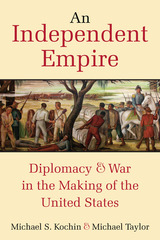
Foreign policies and diplomatic missions, combined with military action, were the driving forces behind the growth of the early United States. In an era when the Old and New Worlds were subject to British, French, and Spanish imperial ambitions, the new republic had limited diplomatic presence and minimal public credit. It was vulnerable to hostile forces in every direction. The United States could not have survived, grown, or flourished without the adoption of prescient foreign policies, or without skillful diplomatic operations.
An Independent Empire shows how foreign policy and diplomacy constitute a truly national story, necessary for understanding the history of the United States. In this lively and well-written book, episodes in American history—such as the writing and ratification of the Constitution, Henry Clay’s advocacy of an American System, Pinckney’s Treaty with Spain, and the visionary but absurd Congress of Panama—are recast as elemental aspects of United States foreign and security policy.
An Independent Empire tells the stories of the people who defined the early history of America’s international relationships. Throughout the book are brief, entertaining vignettes of often-overlooked intellectuals, spies, diplomats, and statesmen whose actions and decisions shaped the first fifty years of the United States. More than a dozen bespoke maps illustrate that the growth of the early United States was as much a geographical as a political or military phenomenon.
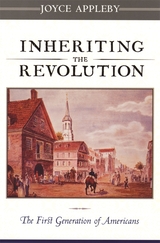
Born after the Revolution, the first generation of Americans inherited a truly new world--and, with it, the task of working out the terms of Independence. Anyone who started a business, marketed a new invention, ran for office, formed an association, or wrote for publication was helping to fashion the world's first liberal society. These are the people we encounter in Inheriting the Revolution, a vibrant tapestry of the lives, callings, decisions, desires, and reflections of those Americans who turned the new abstractions of democracy, the nation, and free enterprise into contested realities.
Through data gathered on thousands of people, as well as hundreds of memoirs and autobiographies, Joyce Appleby tells myriad intersecting stories of how Americans born between 1776 and 1830 reinvented themselves and their society in politics, economics, reform, religion, and culture. They also had to grapple with the new distinction of free and slave labor, with all its divisive social entailments; the rout of Enlightenment rationality by the warm passions of religious awakening; the explosion of small business opportunities for young people eager to break out of their parents' colonial cocoon. Few in the nation escaped the transforming intrusiveness of these changes. Working these experiences into a vivid picture of American cultural renovation, Appleby crafts an extraordinary--and deeply affecting--account of how the first generation established its own culture, its own nation, its own identity.
The passage of social responsibility from one generation to another is always a fascinating interplay of the inherited and the novel; this book shows how, in the early nineteenth century, the very idea of generations resonated with new meaning in the United States.
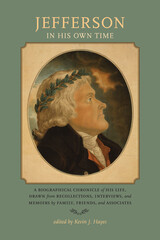
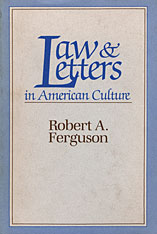
The role of religion in early American literature has been endlessly studied; the role of the law has been virtually ignored. Robert A. Ferguson’s book seeks to correct this imbalance.
With the Revolution, Ferguson demonstrates, the lawyer replaced the clergyman as the dominant intellectual force in the new nation. Lawyers wrote the first important plays, novels, and poems; as gentlemen of letters they controlled many of the journals and literary societies; and their education in the law led to a controlling aesthetic that shaped both the civic and the imaginative literature of the early republic. An awareness of this aesthetic enables us to see works as diverse as Jefferson’s Notes on the State of Virginia and Irving’s burlesque History of New York as unified texts, products of the legal mind of the time.
The Declaration of Independence, the Constitution, and the great political orations were written by lawyers, and so too were the literary works of Trumbull, Tyler, Brackenridge, Charles Brockden Brown, William Cullen Bryant, Richard Henry Dana, Jr., and a dozen other important writers. To recover the original meaning and context of these writings is to gain new understanding of a whole era of American culture.
The nexus of law and letters persisted for more than a half-century. Ferguson explores a range of factors that contributed to its gradual dissolution: the yielding of neoclassicism to romanticism; the changing role of the writer; the shift in the lawyer’s stance from generalist to specialist and from ideological spokesman to tactician of compromise; the onslaught of Jacksonian democracy and the problems of a country torn by sectional strife. At the same time, he demonstrates continuities with the American Renaissance. And in Abraham Lincoln he sees a memorable late flowering of the earlier tradition.
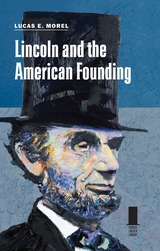
With each chapter describing a particular influence, Morel leads readers from the Founding Father, George Washington; to the founding documents, the Declaration of Independence and Constitution; to the founding compromise over slavery; and finally to a consideration of how the original intentions of the Founding Fathers should be respected in light of experience, progress, and improvements over time. Within these key discussions, Morel shows that without the ideals of the American Revolution, Lincoln’s most famous speeches would be unrecognizable, and the character of the nation would have lost its foundation on the universal principles of human equality, individual liberty, and government by the consent of the governed.
Lincoln thought that the principles of human equality and individual rights could provide common ground for a diverse people to live as one nation and that some old things, such as the political ideals of the American founding, were worth preserving. He urged Americans to be vigilant in maintaining the institutions of self-government and to exercise and safeguard the benefits of freedom for future generations. Morel posits that adopting the way of thinking and speaking Lincoln advocated, based on the country’s founding, could help mend our current polarized discourse and direct the American people to employ their common government on behalf of a truly common good.
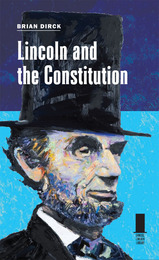
In this highly readable study of Abraham Lincoln’s thoughts and actions concerning the U.S. Constitution, Brian R. Dirck combines extensive primary research and thoughtful, accessible consideration of Lincoln’s views to reveal new insights into Lincoln’s impact on the U.S. Constitution. In the statesman’s roles as a leading antebellum politician, an ardent critic of slavery, and the president of the United States during the Civil War, Lincoln fashioned a strong antislavery constitutional ideology and articulated a constitutional vision of the Civil War that reinforced his determination to restore the Union.
Grounding Lincoln’s constitutionalism in his reading habits and early legal career, Dirck masterfully balances biographical details, Lincoln’s value system, the opinions of his supporters and critics, and key events and ideas to show how his thinking about the U.S. Constitution changed over time. From Lincoln’s deep reverence for the work of the Founding Fathers to his innovative interpretation of presidential war powers, Dirck reveals Lincoln’s understanding of the Constitution to be progressive, emphasizing federal power as a tool to develop the economy, and pragmatic, in that he was often forced to make decisions on the fly during a remarkably volatile period in American history. Lincoln used his conception of presidential war powers to advance the twin causes of Union and emancipation, and Dirck explores the constitutional problems stirred by curbs Lincoln placed on civil liberties, internal security, and freedom of expression during wartime.
More than a straightforward overview of Lincoln’s constitutional views, Lincoln and the Constitution provides a starting point for further inquiry into interpretations and defenses as well as the political, intellectual, and cultural traditions of the founding document of the United States. In the end, Dirck shows, Lincoln viewed the political and legal traditions of the Constitution with optimism, emphasizing
throughout his life the possibilities he believed the document held—always keeping faith in it and swearing to protect it, even as he was awash in a sea of blood and controversy.
Univeristy Press Books for Public and Secondary Schools 2013 edition
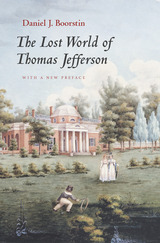
"The volume is too subtle, too rich in ideas for anyone to do justice to it in brief summary, too heavily documented and too carefully wrought for anyone to dismiss its thesis. . . . It is a major contribution not only to Jefferson studies but to American intellectual history. . . . All who work in the history of ideas will find themselves in Mr. Boorstin's debt."—Richard Hofstadter, South Atlantic Monthly
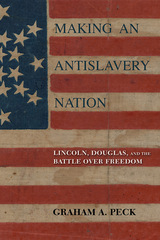
This sweeping narrative presents an original and compelling explanation for the triumph of the antislavery movement in the United States prior to the Civil War. Abraham Lincoln's election as the first antislavery president was hardly preordained. From the country's inception, Americans had struggled to define slavery's relationship to freedom. Most Northerners supported abolition in the North but condoned slavery in the South, while most Southerners denounced abolition and asserted slavery's compatibility with whites' freedom. On this massive political fault line hinged the fate of the nation.
Graham A. Peck meticulously traces the conflict over slavery in Illinois from the Northwest Ordinance in 1787 to Lincoln's defeat of his archrival Stephen A. Douglas in the 1860 election. Douglas's attempt in 1854 to persuade Northerners that slavery and freedom had equal national standing stirred a political earthquake that brought Lincoln to the White House. Yet Lincoln's framing of the antislavery movement as a conservative return to the country's founding principles masked what was in fact a radical and unprecedented antislavery nationalism. It justified slavery's destruction but triggered the Civil War.
Presenting pathbreaking interpretations of Lincoln, Douglas, and the Civil War's origins, Making an Antislavery Nation shows how battles over slavery paved the way for freedom's triumph in America.

Interpretive social science and literary analysis converge in this absorbing book. It is a psychosocial drama in three acts, featuring three very different confrontations between nineteenth-century Americans and the natives of the Marquesas Islands. The Americans, in seeking to come to terms with the Marquesans, found their own cultural identity challenged; they were compelled, under conditions of extreme psychic stress, to discover what it meant to them to be civilized.
The protagonists are the Reverend William Alexander, who led a mission to the Marquesas to rescue the islanders from sin and savagery through the word of God; Captain David Porter, a rationalist intent upon civilizing the natives by educating them; and Herman Melville, seaman, who was held captive for a time by the Typees. The Calvinist, rationalist, and romantic preconceptions of the three were shaken by their experiences in the alien environment of Polynesia. Only Melville, however, came to investigate the civilized identity itself as a source of these shared consternations. T. Walter Herbert offers a fresh perspective on Melville's Typee by considering it in the context of the earlier encounters, and by drawing, as he does throughout, on the insights of cultural anthropology.
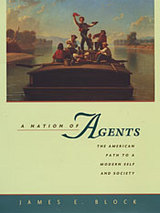
In this sweeping reinterpretation of American political culture, James Block offers a new perspective on the formation of the modern American self and society. Block roots both self and society in the concept of agency, rather than liberty, and dispenses with the national myth of the "sacred cause of liberty"--with the Declaration of Independence as its "American scripture." Instead, he recovers the early modern conception of agency as the true synthesis emerging from America's Protestant and liberal cultural foundations.
Block traces agency doctrine from its pre-Commonwealth English origins through its development into the American mainstream culture on the eve of the twentieth century. The concept of agency that prevailed in the colonies simultaneously released individuals from traditional constraints to participate actively and self-reliantly in social institutions, while confining them within a new set of commitments. Individual initiative was now firmly bounded by the modern values and ends of personal Protestant religiosity and collective liberal institutional authority. As Block shows, this complex relation of self to society lies at the root of the American character.
A Nation of Agents is a new reading of what the "first new nation" did and did not achieve. It will enable us to move beyond long-standing national myths and grasp both the American achievement and its legacy for modernity.
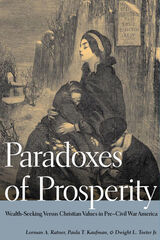
At the same time, the United States felt the influence of the rise of popular mass-circulation newspapers and magazines and the surge in American book publishing. Concern over living correctly as well as prosperously was commonly discussed by leading authors and journalists, who were now writing for ever-expanding regional and national audiences. Women became more important as authors and editors, giving advice and building huge markets for women readers, with the magazine Godey's Lady's Book and novels by Susan Warner, Maria Cummins, and Harriet Beecher Stowe expressing women's views about the troubled state of society. Best-selling male writers--including novelist George Lippard, historian George Bancroft, and travel writer Bayard Taylor--were among those adding their voices to concerns about prosperity and morality and about America's place in the world. Writers and publishers discovered that a high moral tone could be exceedingly good for business.
The authors of this book examine how popular writers and widely read newspapers, magazines, and books expressed social tensions between prosperity and morality. This study draws on that nationwide conversation through leading mass media, including circulation-leading newspapers, the New York Herald and the New York Tribune, plus prominent newspapers from the South and West, the Richmond Enquirer and the Cincinnati Enquirer. Best-selling magazines aimed at middle-class tastes, Harper's Magazine and the Southern Literary Messenger, added their voices, as did two leading business magazines.
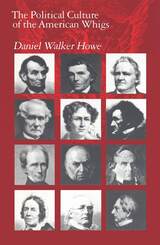
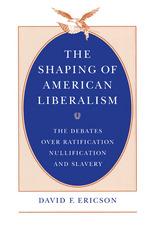
Focusing on three critical debates in American history—the debate between Anti-Federalists and Federalists over the ratification of the Constitution; the debate between the national republicans and the states-rights republicans over the nullification of the tariff; and the Lincoln-Douglas debates over slavery and pluralist democracy—Ericson shows that republicanism, rather than being opposed to liberalism, is in fact an offshoot of it. His descriptions of republicanism and pluralism represent the poles of an evolving tradition of liberal ideas in America: the former championing the claims of the public sphere, general welfare, and civic virtue; the latter protecting the rights of the individual to liberty, property, and privacy.
Republicanism and pluralism are therefore more properly understood as two sets of competing ideas that evolved from common roots. Ericson concludes that although republican themes persist in American politics, the profound transformations brought about by the Civil War made the ascendancy of pluralism virtually inevitable.
This highly original discussion of the relation between liberalism and republicanism—the central concern of much of the recent scholarship in American political thought—will be important reading for those interested in American politics, history, and culture.
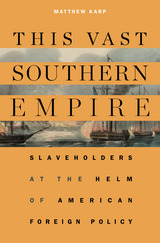
Winner of the John H. Dunning Prize, American Historical Association
Winner of the Stuart L. Bernath Book Prize, Society for Historians of American Foreign Relations
Winner of the James H. Broussard Best First Book Prize, Society for Historians of the Early American Republic
Winner of the North Jersey Civil War Round Table Book Award
Finalist for the Harriet Tubman Prize, Lapidus Center for the Historical Analysis of Transatlantic Slavery
When the United States emerged as a world power in the years before the Civil War, the men who presided over the nation’s triumphant territorial and economic expansion were largely southern slaveholders. As presidents, cabinet officers, and diplomats, slaveholding leaders controlled the main levers of foreign policy inside an increasingly powerful American state. This Vast Southern Empire explores the international vision and strategic operations of these southerners at the commanding heights of American politics.
“At the close of the Civil War, more than Southern independence and the bones of the dead lay amid the smoking ruins of the Confederacy. Also lost was the memory of the prewar decades, when Southern politicians and pro-slavery ambitions shaped the foreign policy of the United States in order to protect slavery at home and advance its interests abroad. With This Vast Southern Empire, Matthew Karp recovers that forgotten history and presents it in fascinating and often surprising detail.”
—Fergus Bordewich, Wall Street Journal
“Matthew Karp’s illuminating book This Vast Southern Empire shows that the South was interested not only in gaining new slave territory but also in promoting slavery throughout the Western Hemisphere.”
—David S. Reynolds, New York Review of Books
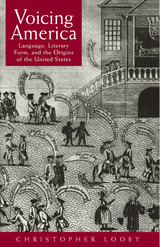
READERS
Browse our collection.
PUBLISHERS
See BiblioVault's publisher services.
STUDENT SERVICES
Files for college accessibility offices.
UChicago Accessibility Resources
home | accessibility | search | about | contact us
BiblioVault ® 2001 - 2024
The University of Chicago Press









